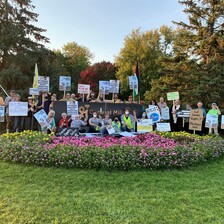The Electronic Intifada 2 December 2008
The movement in Europe to put pressure on companies that benefit from the occupation is growing. Over the last few months, European, Palestinian and Israeli activists have won significant victories toward the 2005 call by Palestinian civil society for boycott, divestment and sanctions (BDS) against Israel. In early October, Barkan Wineries, a subsidiary of Tempo Beer Industry Ltd., decided to divest from an illegal settlement in the Barkan Industrial Park. Dutch Heineken has a 40 percent share in Tempo Beer Industry and as a member of the United Nations Global Compact, it has promised to support and respect the protection of internationally proclaimed human rights and to make sure they are not complicit in human rights abuses. According to the Palestinian human rights organization Al-Haq, Heineken played a positive role in this decision by adhering to its corporate social responsibility policies.
Diakonia Sweden released in October a critical report on Swedish Assa Abloy, owner of Mul-T-Lock which has a production unit in the Barkan Industrial Park. In response to the report, Assa Abloy announced its removal of the production unit, and it expressed its “regret that the inappropriateness has not been noted internally, during the eight years of ownership, of having a production unit on the West Bank.”
The media attention in Sweden for Assa Abloy’s decision had an unexpected spin off. Journalists contacted Diakonia to learn if more companies ran operations in illegal Israeli settlements. As a consequence Soda Stream came under fire, because their carbonated drink machine are partly manufactured in illegal Israeli settlements in the West Bank. Joahn Kallinge, chief executive of Empire Company, which sells the machines in Sweden, told the press that he was not aware that Soda Stream ran a factory in a West Bank settlement. He added that Empire did not want their Soda Stream products to be manufactured there. The Swedish Foreign Ministry made known that “the opinion of the Swedish government is that establishing business, or business relations with companies in the settlements are inappropriate.”
In addition, Veolia came under attack because it was bidding on a substantial eight-year contract for Stockholm County. Politicians announced on prime time television that they wanted Veolia to be excluded from bidding because of the company’s involvement in the Israeli light rail project that illegally runs on Palestinian land.
In late November, the Scottish Palestine Solidarity Campaign announced that Israeli Eden Springs, a water cooler company, closed its East of Scotland depot after losing “hundreds of contracts” across Scotland. A number of organizations voted to boycott Eden Springs, because of their violations of international law, including local councils and ferries, and Watt University in Edinburgh, Stevenson College, the Scottish Council of Voluntary Organisations, trade unions, and student bodies. The closure of Eden Springs’ Scotland depot and the loss of its contracts is widely recognized within the industry to be due in part to a determined publicity campaign by the Scottish Palestine Solidarity Campaign.
On 27 November, United Civilians for Peace (UCP) in the Netherlands announced that the Anglo-Dutch transnational company Unilever had announced it would divest from the Beigel and Beigel factory located in the Barkan Industrial Park. Unilever owns a 51 percent share in the pretzel and snacks factory. The decision was made after UCP engaged with Unilever in a constructive dialogue about Unilever’s presence in Barkan on the basis of a research report entitled, “Improper Advantage: A study of Unilever’s investments in an illegal Israeli settlement.”
It is important to inform companies that the call for BDS will be in place until Israel ends all of its violations of international law. While some companies have decided to pull their operations out of illegal Israeli settlements to control the damage to their corporate image, others continue to ignore their responsibilities. The most egregious example is Veolia and Alstom, which were informed years ago that they are complicit in violations of international law due to their involvement in the Jerusalem light rail project. Although they continue to resist efforts by activists, the pressure put on Eden Springs in Scotland demonstrated that European civil society will not allow companies to evade their responsibilities.
Adri Nieuwhof is a consultant and human rights advocate.




